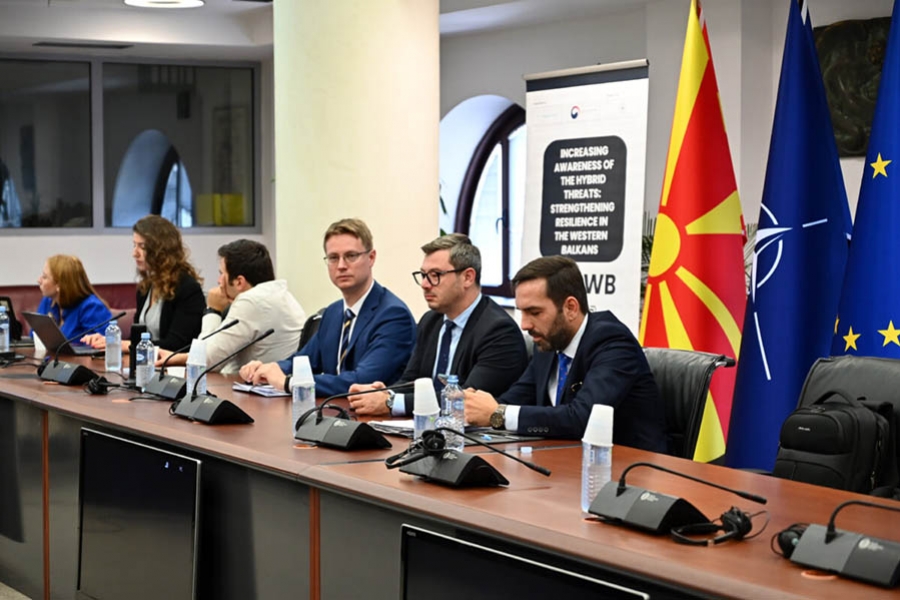Disinformation campaigns full of conspiracy theories and media manipulations are being conducted, and these narratives are present mainly in the public when discussing the constitutional amendments that are our condition for the continuation of Macedonias European integration path. That is why it is necessary to institutionally strengthen the resistance to lies that are placed in the public, but also to work on raising awareness about hybrid threats that undoubtedly represent a security threat both for the state and for the countries of the Western Balkans.

Disinformation campaigns full of conspiracy theories and media manipulations are being conducted, and these narratives are present mainly in the public when discussing the constitutional amendments that are our condition for the continuation of Macedonias European integration path. That is why it is necessary to institutionally strengthen the resistance to lies that are placed in the public, but also to work on raising awareness about hybrid threats that undoubtedly represent a security threat both for the state and for the countries of the Western Balkans.

Among other things, these are the conclusions of todays debate held at the Ministry of Foreign Affairs on the topic "Raising awareness of hybrid threats - strengthening resilience in the Western Balkans," organized by the Euro-Atlantic Council of North Macedonia, with the support of the Visegrad Fund and the Ministry of Foreign Affairs of South Korea.
At todays discussion, in addition to representatives from the Euro-Atlantic Council, S. Macedonia was attended by the State Secretary in the Ministry of Foreign Affairs, Filip Tosevski, the Czech Ambassador to the Republic of North Macedonia, H.E. Jaroslav Ludva, as well as other representatives from the non-governmental sector.
The interlocutors who participated in the debate pointed out that the biggest threats to security in the region are hybrid threats and Russias aggression against Ukraine.
Moderator of the "National Symposium on Dealing with Disinformation" Ilija Dzhugumanov pointed out that the problem of disinformation and fake news in the country, unlike a few years ago and now, is that these narratives are significantly more present and stronger when the government tries to continue negotiations for membership in the European Union. According to him, Russian influence in the Western Balkans plays a significant role in propagating falsehoods in the region.
- In the Balkans, the influence of third countries and centers that use emotions related to the war in Ukraine, in the direction of creating instability, has increased - noted the Secretary General of the Euro-Atlantic Council of North Macedonia, Ilija Dzhugumanov.
Cooperation between countries at the regional level, which are part of NATO, is necessary, as he said, to prevent the spread of such narratives.
State Secretary in the Ministry of Foreign Affairs, Filip Tosevski, pointed out that Russias goals had not changed since last year when it began its invasion of Ukraine, and they are aimed at the Western Balkan region missing out on full membership of the Union by spreading falsehoods and manipulations in the public.
- Russian aggression and dealing with misinformation coming from the Russian side are of crucial importance because they are globally directed at the Western Balkans region to spirally spread falsehoods in societies that will later create problems and obstacles for them on the way to complete aspiration in the European Union - he pointed out Tosevski.
Tosevski believes that even if Ukraine achieves success during the military offensive, Russia will remain a security threat in the future, mainly because of its ability to spread disinformation.
On the other hand, the ambassador of the Czech Republic in the Republic of North Macedonia, H.E. Jaroslav Ludva, emphasized that good neighborly relations are an essential part of the European integration process of the Western Balkans, and the EU accession process can help in more excellent promotion and improvement of the dialogue between Bulgaria and Macedonia.
- The Czech Republic has always supported the European road S. of Macedonia, and we are proud that it started accession negotiations with the European Union at the beginning of our presidency. In addition, our embassy in Skopje has been cooperating with South Macedonia and Bulgaria since the time of the Czech presidency of the Union, as evidenced by numerous conferences organized by the Embassies of the Czech Republic in Skopje and Sofia on topics related to good neighborly relations between the two countries. However, it is necessary to strengthen activities in that direction, but also to actively deal with misinformation that is present in this process to achieve a natural movement of European integration of the country and the region - emphasized Ambassador Ludva and added that the problem between the two countries becomes serious especially when fake news and disinformation that want to harm the process are being spread to the public.
The participants of the debate agree that Russian propaganda is increasingly available, widespread, and more robust in the online space of North Macedonia and that through it, the influence of the official Kremlin is increasing, and efforts to divide and polarize society are intensifying, undermining trust in institutions and the media and causing unrest among citizens. According to them, it is similar in the surrounding countries when it comes to the influence of Russian propaganda in the democratic processes of the Western Balkans.
In all societies there are issues that are rather being skipped. Certain...
The neoliberal path, started in 2001, has led to especially bad results in Serbi...
For centuries, the region was subsumed within the Ottoman and Hungarian Empires,...
"Serbia has returned to the systemic and anti-systemic position of the political...
In reality, Serbia is closer than ever to NATO. In the course of the last five y...